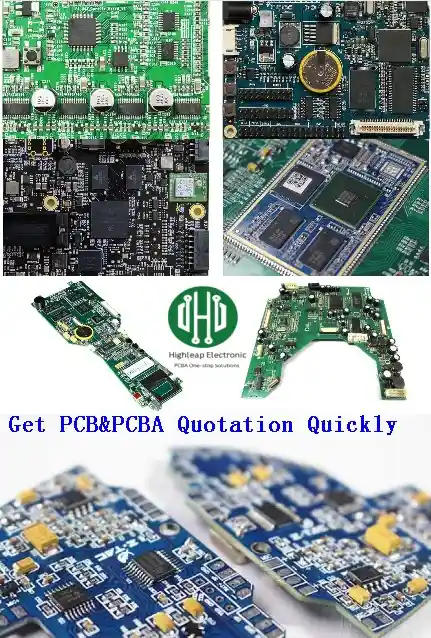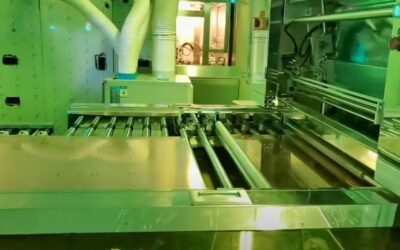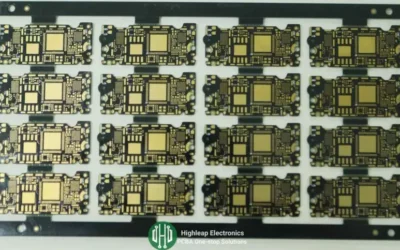Back to blog
The Top 5 Things You Must Know When Working with a PCBA Contract Manufacturer

In the world of electronics manufacturing, partnering with a PCB Assembly contract manufacturer can be a game-changer for businesses looking to scale their operations efficiently and effectively. As the backbone of modern electronic devices, a well-assembled PCB ensures the heart of your product beats without fail. However, the journey from concept to reality is fraught with challenges, particularly when it comes to selecting the right PCBA partner. It’s not just about finding a vendor who can solder components onto a board; it’s about forming a strategic partnership with a manufacturer who understands your product’s vision, quality standards, and market demands. In this guide, we’ll explore the top five essential aspects you must know to navigate the complexities of working with a PCBA contract manufacturer. From understanding the breadth of services offered to ensuring your product is future-proof, we’ll provide you with the insights needed to make informed decisions, avoid common pitfalls, and ultimately, enhance your product’s success in the competitive electronics market.
What a PCBA Contract Manufacturer Can Offer.
1. Comprehensive Service Offering
A proficient PCBA contract manufacturer extends beyond basic assembly services. They provide a comprehensive suite of solutions, including design support, prototype development, component sourcing, full-scale production, and even testing and quality assurance. This full-service approach can significantly streamline the manufacturing process, allowing you to focus on innovation and product development while leaving the complexities of production logistics in capable hands.
2. Customization and Scalability
Customization is key in the world of electronics manufacturing. Your PCBA partner should be able to tailor their services to fit your unique product requirements, whether that means accommodating complex designs, special materials, or specific component sourcing strategies. Equally important is scalability. As your product evolves and demand grows, your manufacturer must be able to scale up production without sacrificing quality or efficiency. This flexibility can be a critical factor in the long-term success of your product.
3. Cutting-Edge Technology and Expertise
Staying at the forefront of technology is essential in the electronics industry. A top-tier PCBA contract manufacturer invests in the latest assembly technologies and maintains a team of experienced engineers and technicians. This ensures that they can handle a wide range of PCB assembly needs, from simple boards to complex multi-layered designs, with precision and efficiency.
4. Prototype to Production Transition
The transition from prototype to production is a critical phase in any product’s lifecycle. A skilled PCBA manufacturer will have a streamlined process for this transition, ensuring that lessons learned and optimizations discovered during prototyping are seamlessly integrated into the production run. This not only improves product quality but also reduces time to market.
5. Quality Assurance and Testing
Quality assurance is non-negotiable. Your PCBA contract manufacturer should have a robust system in place for testing and quality assurance, ensuring that every board meets stringent standards before it leaves the factory. This includes both functional testing and aesthetic inspections, guaranteeing that the final product aligns with your expectations and reliability requirements.

Quality Assurance in PCBA Manufacturing
1. Certifications and Standards Compliance
The foundation of a reliable QA process in PCBA manufacturing lies in adherence to international standards and certifications. Look for manufacturers that hold certifications such as ISO 9001 for quality management systems, ISO 14001 for environmental management, and IPC-A-610 for the acceptability of electronic assemblies. These certifications are not just badges of honor; they signify a manufacturer’s commitment to maintaining high standards throughout production.
2. Advanced Testing Methods
Testing is the linchpin of quality assurance. Effective PCBA manufacturers employ a variety of testing methods to identify potential failures and defects. These might include Automated Optical Inspection (AOI), In-Circuit Testing (ICT), Functional Testing, and X-Ray Inspection. Each testing method has its strengths, and the best manufacturers know when and how to apply them to ensure that every component and assembly meets or exceeds expectations.
3. Continuous Improvement and Feedback Loops
Quality assurance is an ongoing journey, not a destination. Leading PCBA manufacturers invest in continuous improvement programs, leveraging feedback from testing, customer inputs, and production outcomes to refine their processes. This iterative approach helps in minimizing defects, improving efficiency, and ultimately, delivering superior products.
4. Supplier Quality Management
The quality of a PCBA is not only dependent on the assembly process but also on the components used. A robust QA program extends to supplier quality management, ensuring that all components sourced meet stringent quality criteria. This involves regular supplier audits, component testing, and a proactive approach to managing supply chain risks.
5. Customer-Centric QA Policies
Finally, the best PCBA contract manufacturers understand that quality assurance should be aligned with customer expectations and requirements. This means offering customizable QA plans, transparent reporting, and open communication channels for feedback and adjustments. Such a customer-centric approach ensures that the final product not only meets technical specifications but also aligns with market needs and consumer expectations.
Navigating Costs and Budgeting
1. Transparent Pricing Models
Transparency is crucial when it comes to pricing. A reputable PCBA manufacturer will provide clear, upfront cost estimates that include detailed breakdowns of material, labor, and overhead expenses. This transparency allows you to understand exactly what you’re paying for and helps identify areas where costs can be optimized.
2. Economies of Scale
One of the advantages of working with a PCBA contract manufacturer is the potential for economies of scale. As production volume increases, the cost per unit often decreases due to more efficient use of materials, labor, and machinery. Discuss volume pricing with your manufacturer to understand how larger orders can reduce your overall costs.
3. Component Sourcing Strategies
The cost of components can significantly impact the total cost of PCBA manufacturing. Work with your manufacturer to explore different component sourcing strategies, such as bulk purchasing, alternative suppliers, or substituting less expensive components that do not compromise the quality or functionality of your product.
4. Design for Manufacturability (DFM) Advice
A design optimized for manufacturability can reduce costs significantly. Your PCBA contract manufacturer should offer DFM advice to help identify potential issues before production begins, such as simplifying the design, using more common component packages, or optimizing the layout for easier assembly. These changes can lead to lower production costs and reduced waste.
5. Cost-Saving Tips Without Compromising Quality
Finally, your manufacturer should be able to suggest cost-saving measures that do not compromise the quality of your product. This could include optimizing the PCB layout for more efficient use of space, selecting cost-effective materials that meet your specifications, or recommending minor design adjustments that reduce manufacturing complexity.

The Importance of Effective Communication
1. Establishing Clear Communication Channels
The foundation of a successful partnership is clear and open communication. It’s essential to establish direct channels between your team and the manufacturer’s project management and engineering teams. This ensures that any questions, concerns, or changes can be addressed promptly, minimizing delays and misunderstandings.
2. The Role of Project Management in Timely Deliveries
A skilled project manager coordinates all aspects of the PCBA manufacturing process, from component sourcing to final assembly and testing. They monitor timelines, manage resources, and ensure that each phase of the project aligns with the agreed-upon schedule. This level of oversight is crucial for meeting launch dates and avoiding costly delays.
3. Utilizing Project Management Tools
Leading PCBA manufacturers utilize advanced project management tools to track progress, manage documentation, and facilitate communication. These tools provide real-time updates and visibility into the manufacturing process, allowing you to stay informed and make timely decisions.
4. Problem-Solving and Adaptability
Challenges and unexpected issues are inevitable in any manufacturing project. Effective communication and project management facilitate swift problem-solving and adaptability. By working closely with your manufacturer, you can quickly address and overcome obstacles, ensuring that your project remains on track.
5. Building a Collaborative Relationship
Finally, effective communication and project management contribute to building a strong, collaborative relationship with your PCBA manufacturer. This partnership approach fosters trust, encourages transparency, and ensures that both parties are aligned in their goals for the project’s success.
Innovation and Scalability in PCBA
1. Staying Ahead with Technology Trends
The first step in future-proofing your product is to ensure your PCBA manufacturer is committed to innovation and staying abreast of technology trends. This includes adopting the latest manufacturing technologies, materials, and processes that can enhance the performance, durability, and cost-effectiveness of your PCBAs.
2. Scalability for Future Demands
Scalability is critical for adapting to future market demands and production needs. Your manufacturer should be able to scale production up or down efficiently, without compromising quality or significantly increasing costs. This flexibility allows you to respond quickly to market changes and customer needs.
3. Design for Future Compatibility
Designing your product for future compatibility means considering how it can be updated or upgraded without a complete redesign. This could involve modular designs, easily replaceable components, or extra capacity built into the PCB for future functionalities. Your PCBA manufacturer should provide valuable input on making your product adaptable for future developments.
4. Embracing Sustainable Manufacturing Practices
Sustainability is increasingly becoming a priority for consumers and businesses alike. Future-proofing also means considering the environmental impact of your product. Work with a PCBA manufacturer that employs sustainable manufacturing practices, such as using eco-friendly materials and minimizing waste, to ensure your product meets future regulatory standards and consumer expectations.
Conclusion
Partnering with a PCB Assembly contract manufacturer is a strategic move that can significantly enhance your product’s success. By understanding the essential aspects of working with a PCBA manufacturer, including comprehensive service offerings, customization, scalability, cutting-edge technology, and robust quality assurance, businesses can navigate the complexities of electronics manufacturing with confidence. Highleap Electronic offers industry-leading expertise and advanced solutions to ensure your product meets the highest standards of quality and efficiency.
FAQs
1. What role does a PCBA manufacturer’s design support play in product development?
Design support from a PCBA manufacturer can streamline the development process by providing expertise in design for manufacturability (DFM), ensuring that the product design is optimized for efficient production, reducing costs, and minimizing potential issues during manufacturing.
2. How important is the location of a PCBA manufacturer for logistics and supply chain management?
The location of a PCBA manufacturer can significantly impact logistics and supply chain efficiency. Choosing a manufacturer in close proximity to your business or key markets can reduce shipping times, lower transportation costs, and enhance overall supply chain reliability.
3. What are the benefits of using automated assembly equipment in PCBA manufacturing?
Automated assembly equipment enhances precision, consistency, and speed in the PCB assembly process. This reduces human error, increases production throughput, and ensures high-quality assembly, especially for complex and high-volume projects.
4. How can a PCBA manufacturer help in ensuring compliance with industry-specific standards?
A knowledgeable PCBA manufacturer will be familiar with industry-specific standards and regulations, such as those in medical, automotive, and aerospace sectors. They can provide guidance and ensure that the assembled PCBs meet all necessary compliance requirements, avoiding legal and regulatory issues.
5. What strategies can be employed to reduce lead times in PCBA manufacturing?
To reduce lead times, strategies such as maintaining a well-stocked inventory of common components, utilizing efficient production scheduling, implementing rapid prototyping, and fostering strong supplier relationships can be employed. These practices help in meeting tight deadlines and accelerating time-to-market for new products.
Related Articles
Exploring PCB Surface Treatment: The Significance of ENIG and DIG
This comprehensive analysis will delve into the Electroless Nickel Immersion Gold (ENIG) process, exploring why it is increasingly becoming the go-to choice for PCB manufacturers globally.
Enhancing PCB Reliability: Reduce PCB Dry Film Penetration
Revolutionize your PCB manufacturing with our cutting-edge PCB dry film technology!
High-Quality Rigid PCB Circuit Board Fabrication Services
Rigid PCBs are the conventional type of FR4 PCB, comprising a rigid substrate typically made of materials like fiberglass.




